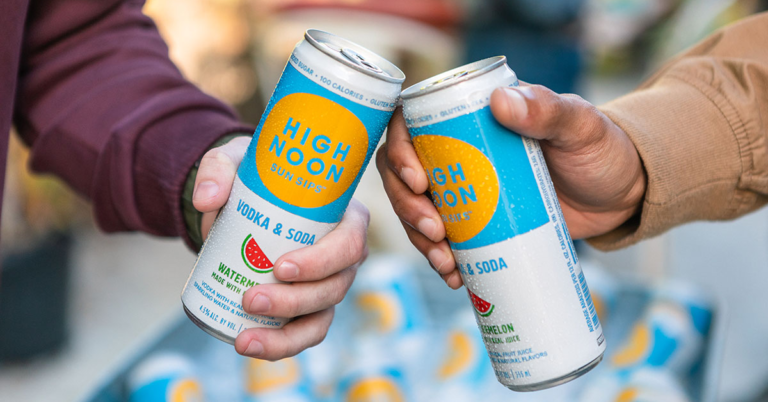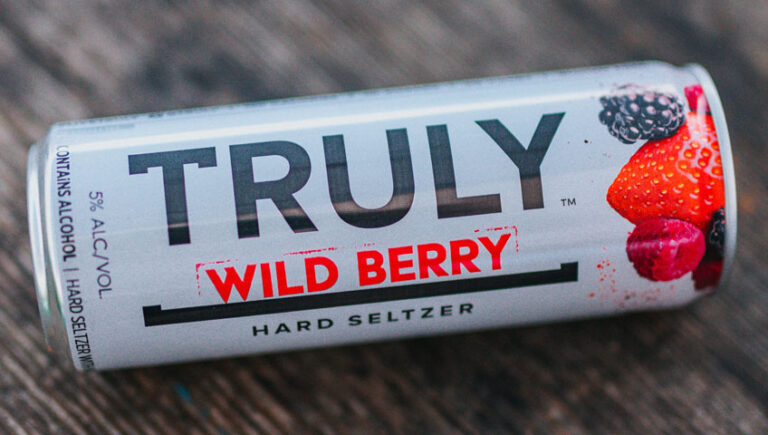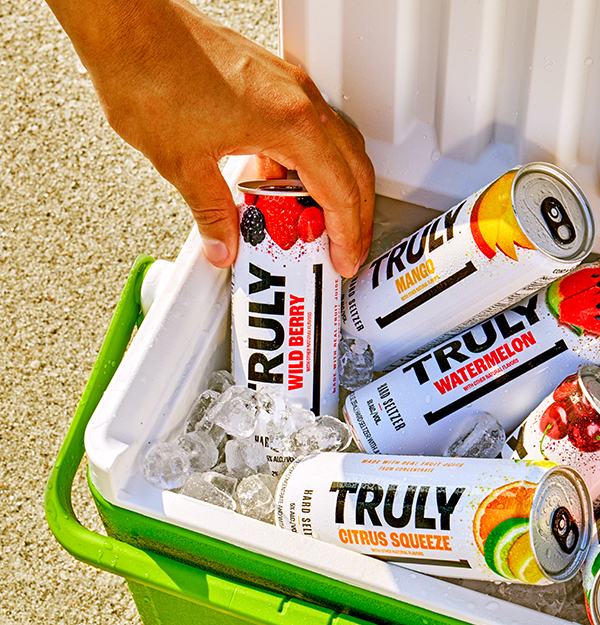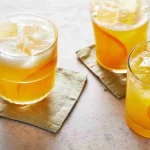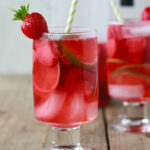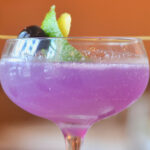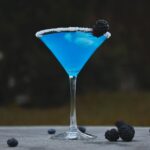Hard seltzer, the sparkling beverage with a touch of alcohol, has become a popular choice for its refreshing taste and lower calorie count compared to beer. But with its increasing popularity, a question arises: can hard seltzer get skunked like beer?
What is Skunking?
Skunking, in the context of beverages, is a process that leads to the development of an off-flavor in the drink, resembling the unpleasant scent of a skunk’s spray. This phenomenon is most commonly associated with beer but can also affect other light-sensitive beverages.
The primary cause of skunking involves a chemical reaction between the hops present in the beverage, ultraviolet (UV) light, and certain compounds.
When beer or other light-sensitive drinks are exposed to UV light, the photons in the light interact with the isomerized alpha acids from hops.
This interaction results in the formation of compounds known as mercaptans or thiol compounds. These compounds have a distinct and undesirable odor, reminiscent of a skunk’s spray.
The intensity of the skunking process can vary depending on factors such as the amount and type of hops in the beverage, the duration and intensity of light exposure, and the type of packaging used.
Skunking is more likely to occur in beverages stored in clear or green glass bottles, as these allow more UV light to penetrate. In contrast, cans and brown glass bottles provide better protection against UV light, reducing the risk of skunking.
Causes of Skunking in Beverages
Here are some reasons of skunking.
Hops and Light Sensitivity
Hops, those little flavor-makers in many beverages, can be a double-edged sword. When exposed to ultraviolet (UV) light, a chemical reaction unfolds.
The photons in the light interact with the isomerized alpha acids from hops, setting the stage for the skunking process.
Formation of Mercaptans
As this interaction takes place, it leads to the creation of compounds known as mercaptans or thiol compounds. These aren’t the kind of compounds you want in your drink. They come with a robust, skunk-like odor that can seriously impact the beverage’s taste and aroma.
Intensity of the Reaction
The extent of this reaction isn’t a one-size-fits-all scenario. It hinges on various factors, including the quantity and type of hops present in the beverage.
Additionally, the duration and intensity of exposure to light play pivotal roles in determining how intense the skunking experience will be.
Packaging Matters
The type of packaging your beverage comes in significantly influences the likelihood of skunking. Clear and green glass bottles might look fancy, but they’re more susceptible to UV light.
On the other hand, cans and brown glass bottles act as superheroes, offering better protection against the light and reducing the risk of skunking.
Storage Conditions
Where you store your favorite drink matters. If it’s getting a daily dose of direct sunlight or lounging in warmth for extended periods, the chances of skunking increase.
Optimal storage involves cool, dark spaces that shield your beverage from UV light, helping it stay skunk-free.
Beer’s Natural Defense
Some beers are brewed with hop extracts or have reduced hop content, intentionally minimizing the risk of skunking. Craft brewers often opt for brown bottles or cans, understanding that these choices better preserve the beer’s quality and protect it from the unwanted effects of UV light exposure.
Understanding these causes not only sheds light on the skunking process but also empowers consumers and brewers to make informed choices, safeguarding the integrity of their beloved beverages.
Can Hard Seltzer Get Skunked?
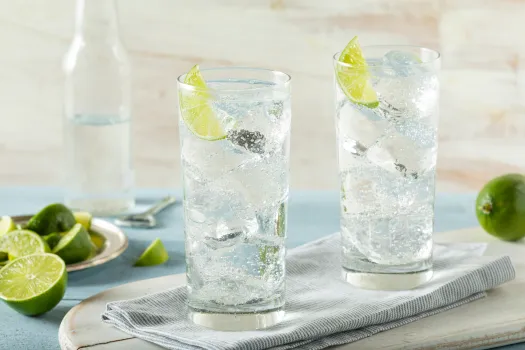
When it comes to hard seltzer and the possibility of getting skunked, the answer is a bit unique compared to traditional beers. In the world of hard seltzers, skunking is less likely to occur, and here’s why:
Hard seltzers have a different composition compared to beer. While beer relies on hops for its distinct flavor, hard seltzers often don’t use hops or use them in minimal amounts.
Since skunking is primarily associated with the interaction between hops and UV light, the reduced or absence of hops in hard seltzers minimizes the risk of skunking.
Furthermore, hard seltzers are commonly packaged in cans or opaque bottles, which provide better protection against UV light.
Can hard seltzer get skunked also depends on packaging. Unlike the clear and green glass bottles often used for beer, the packaging of hard seltzers acts as a shield, reducing the potential for skunking.
While hops take a backseat in the hard seltzer world, it’s worth noting that some alternatives might be at play in flavor creation.
Though not as prone to skunking as hops, these compounds can potentially react with light. However, given the overall low risk due to the absence of hops and protective packaging, the likelihood of encountering a skunked taste in hard seltzers remains notably low.
Storage Conditions Influence
The saga of skunking in hard seltzer doesn’t stop with the absence of hops and smart packaging; storage conditions also determine Can hard seltzer get skunked.
Hard seltzers, like any beverage, should avoid prolonged exposure to direct sunlight. Storing them in cool, dark spaces helps maintain their quality over time.
Additionally, the choice of container matters. Cans and brown glass bottles, commonly used for hard seltzers, provide superior protection against UV light compared to their transparent counterparts.
Lastly, while hard seltzers are resilient, it’s a good idea to savor them within a reasonable time frame to ensure the flavors stay as refreshing as intended.
So, in the realm of hard seltzers, the likelihood of Can hard seltzer get skunked is considerably lower. Feel free to enjoy your bubbly and fruity hard seltzer without the worry of it taking on that unpleasant skunky aroma.
Can Hard Seltzer Go From Cold To Warm Back To Cold?
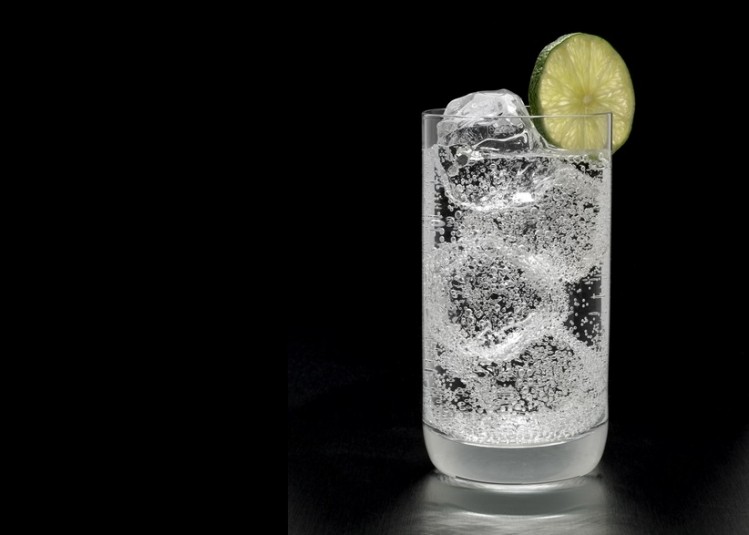
Yes, hard seltzer can undergo temperature changes from cold to warm and back to cold without any significant health or safety concerns.
Unlike some beverages that might be sensitive to temperature fluctuations, hard seltzer is generally resilient in this regard.
However, while the temperature changes themselves won’t pose health risks, they may impact the sensory experience of consuming hard seltzer. Here are a few things to consider:
- Carbonation Levels: Rapid temperature changes can affect the level of carbonation in the seltzer. If you go from cold to warm and back to cold, you may notice changes in the effervescence or fizziness of the drink. This is a natural response to temperature variations and doesn’t make the beverage harmful.
- Condensation: Moving a cold hard seltzer to a warmer environment might cause condensation to form on the can or bottle. Wiping off excess moisture before consuming is advisable for a more enjoyable drinking experience.
- Flavor: Extreme temperature changes can influence the perception of flavor. While this won’t cause any health issues, you might notice subtle differences in taste depending on whether the seltzer is consumed cold or at room temperature.
In summary, while hard seltzer can tolerate temperature fluctuations, it’s always a good idea to store and enjoy it in conditions that align with your preferences.
If you prefer a colder beverage, keep it chilled, and if it warms up, you can still safely enjoy it. Just be mindful of potential changes in carbonation and flavor that may occur with varying temperatures. Cheers to flexible seltzer enjoyment!
Factors Affecting Skunking in Hard Seltzer
Understanding these factors provides consumers and producers with valuable insights into preserving the quality of hard seltzer.
1. Impact of Sunlight and Fluorescent Light
The susceptibility of hard seltzer to skunking is intricately tied to its exposure to light, particularly sunlight and fluorescent light.
When hard seltzer is left to bask in the glow of these lights, the ultraviolet (UV) rays can initiate a chemical reaction.
This reaction, commonly associated with the interaction of hops and UV light in beer, leads to the development of undesirable skunky flavors.
Therefore, it’s crucial to shield hard seltzer from prolonged exposure to sunlight and fluorescent light to preserve its crisp and refreshing taste.
2. Role of Clear Glass Bottles
The choice of packaging materials contributes significantly to the vulnerability of hard seltzer to skunking. Clear glass bottles, while visually appealing, pose a higher risk due to their transparency.
These bottles allow UV light to penetrate and interact with the beverage, potentially leading to skunking. The impact of clear glass bottles on skunking is a crucial consideration for manufacturers and consumers alike.
3. Influence of Long Storage Time:
Time can be both a friend and a foe when it comes to preserving the flavor of hard seltzer. While hard seltzers are generally crafted for freshness, extended periods of storage can influence the beverage’s taste.
Prolonged exposure to various environmental factors, including light and fluctuating temperatures, may contribute to flavor deterioration.
How Skunking Can Affect Hard Seltzer
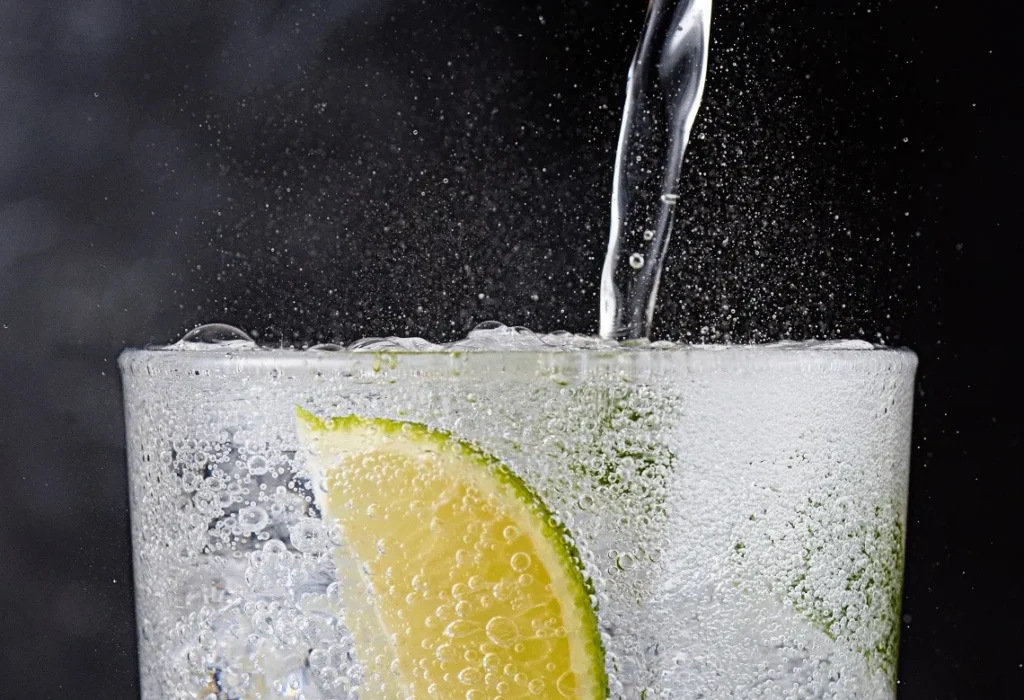
Skunking, a process typically associated with beer, can indeed have an impact on the delightful world of hard seltzer. Understanding how skunking can affect hard seltzer involves exploring the potential changes in flavor, aroma, and overall drinkability:
1. Unpleasant Flavor Transformation
Skunking introduces undesirable flavors into the hard seltzer, altering its taste profile. The formation of compounds, particularly mercaptans or thiol compounds, can impart a skunky and off-putting taste to the beverage. This transformation compromises the intended crisp and refreshing flavor that defines hard seltzer.
2. Aroma Distortion
In addition to affecting taste, skunking can distort the aroma of hard seltzer. The skunky compounds produced during the reaction with light contribute to an unpleasant odor, reminiscent of a skunk’s spray. This aromatic distortion diminishes the overall sensory experience of enjoying a hard seltzer.
3. Diminished Drinkability
The ultimate result of skunking is a decrease in the overall drinkability of hard seltzer. Consumers may find it challenging to enjoy a beverage that has undergone flavor and aroma changes.
Skunked hard seltzer can be a disappointment, especially when compared to the crisp and clean taste that is characteristic of this popular beverage.
4. Visual Impact
While not as pronounced as in beer, skunking can also have visual effects on hard seltzer. The beverage may experience changes in color or clarity due to the chemical reactions induced by exposure to light.
While not the primary concern, alterations in appearance can signal that the beverage has undergone undesirable changes.
5. Impact on Brand Reputation
For producers of hard seltzer, skunking can have broader implications. Consistently delivering a product with a skunky taste can harm brand reputation.
Consumers expect a certain level of quality and consistency, and the occurrence of skunking may erode trust in the brand.
Tips to Prevent Hard Seltzer from Skunking
Enjoying your hard seltzer without the fear of skunking is entirely achievable with a few mindful steps. Here are some tips to keep that crisp and refreshing taste intact:
1. Opt for Opaque Packaging:
Choose hard seltzers that come in cans or opaque bottles. These materials act as effective shields, preventing UV light from penetrating and initiating the skunking process. Opaque packaging helps maintain the beverage’s quality and reduces the risk of undesirable flavor changes.
2. Store in a Cool, Dark Place:
Where you store your hard seltzer matters. Keep it in a cool, dark place away from direct sunlight and fluorescent light. Exposure to light, especially UV rays, accelerates the skunking process. By providing a dark and cool environment, you contribute to the longevity of the beverage’s freshness.
3. Check the Expiration Date:
Be mindful of the expiration date on the packaging. Hard seltzers, like any beverage, have a shelf life. Consuming them before the expiration date ensures that you’re enjoying the drink at its best, minimizing the risk of encountering skunked flavors.
4. Avoid Clear Glass Bottles:
If given the option, opt for hard seltzers packaged in cans or opaque bottles over clear glass bottles. Clear glass allows more light to reach the beverage, increasing the chances of skunking.
Choosing alternative packaging materials provides an additional layer of protection against UV exposure.
5. Consume Within a Reasonable Timeframe:
While hard seltzers are designed for freshness, it’s advisable to consume them within a reasonable timeframe. Extended storage periods may increase the risk of flavor deterioration.
By enjoying your hard seltzer relatively soon after purchase, you ensure a more consistent and enjoyable drinking experience.
6. Be Mindful of Storage Conditions:
Consider where you store your hard seltzers. Avoid leaving them in warm or fluctuating temperature environments, as this can impact the beverage’s quality.
Consistent and moderate temperatures contribute to the longevity of the refreshing taste of hard seltzer.
7. Choose Quality Brands:
Opt for hard seltzer brands known for quality and attention to packaging. Reputable brands often take extra measures to protect their beverages from skunking, using appropriate packaging materials and providing clear guidelines on storage conditions.
By incorporating these tips into your hard seltzer routine, you can confidently enjoy your favorite bubbly beverage without worrying about the unwelcome effects of skunking. Cheers to keeping it crisp, refreshing, and skunk-free!
Are there any Health Risks Associated With Drinking Skunked Seltzer?
No, drinking skunked seltzer is generally not associated with health risks. Skunking in seltzer typically results from exposure to light, which can alter the taste and aroma of the beverage but does not pose any health hazards.
Skunking in hard seltzer is a phenomenon that primarily affects the flavor and aroma of the drink, creating an unpleasant taste reminiscent of a skunk’s spray.
While the altered taste may be off-putting, the skunked seltzer itself is not harmful to consume. It’s important to note that the compounds formed during skunking are generally not toxic or dangerous.
Therefore, if you accidentally consume skunked seltzer, there is no need to be concerned about adverse health effects.
Does Hard Seltzer Expire?
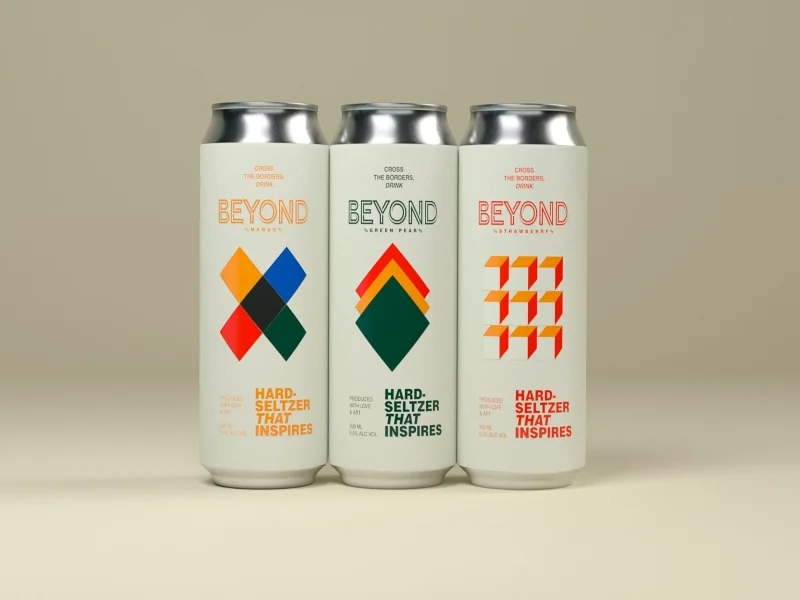
Yes, hard seltzer can expire. Like many beverages, hard seltzer has a shelf life, and its quality can deteriorate over time.
Most hard seltzers have an expiration date printed on the packaging, indicating the recommended period for optimal flavor and quality.
While hard seltzer typically has a longer shelf life compared to some perishable items, it’s advisable to check the expiration date before consuming. As hard seltzer ages, changes in flavor, carbonation levels, and overall quality may occur.
Also Read: Does High Noon Hard Seltzer Expire?
How do I know if Hard Seltzer is Expired?
Here are a few things to consider regarding the expiration of hard seltzer:
- Flavor Changes: Over time, the flavors in hard seltzer may subtly change. The beverage might not taste as crisp and refreshing as it did when it was fresh.
- Carbonation Loss: Carbonation levels can diminish over time, affecting the fizziness or effervescence of the seltzer.
- Packaging Integrity: The condition of the packaging can also impact the shelf life. Damaged or compromised packaging may expose the seltzer to external elements, accelerating the expiration process.
To ensure the best drinking experience, it’s recommended to consume hard seltzer before the expiration date.
Proper storage in a cool, dark place can help preserve its quality. If a hard seltzer has passed its expiration date, it’s not necessarily harmful to consume, but the flavor and overall enjoyment may be compromised.
Always check the packaging for guidance on storage and expiration, and when in doubt, err on the side of caution. Cheers to enjoying your hard seltzer at its freshest!
Check out our Shots recipes:
Can White Claw, Truly, and High Noon hard seltzers get Skunked?
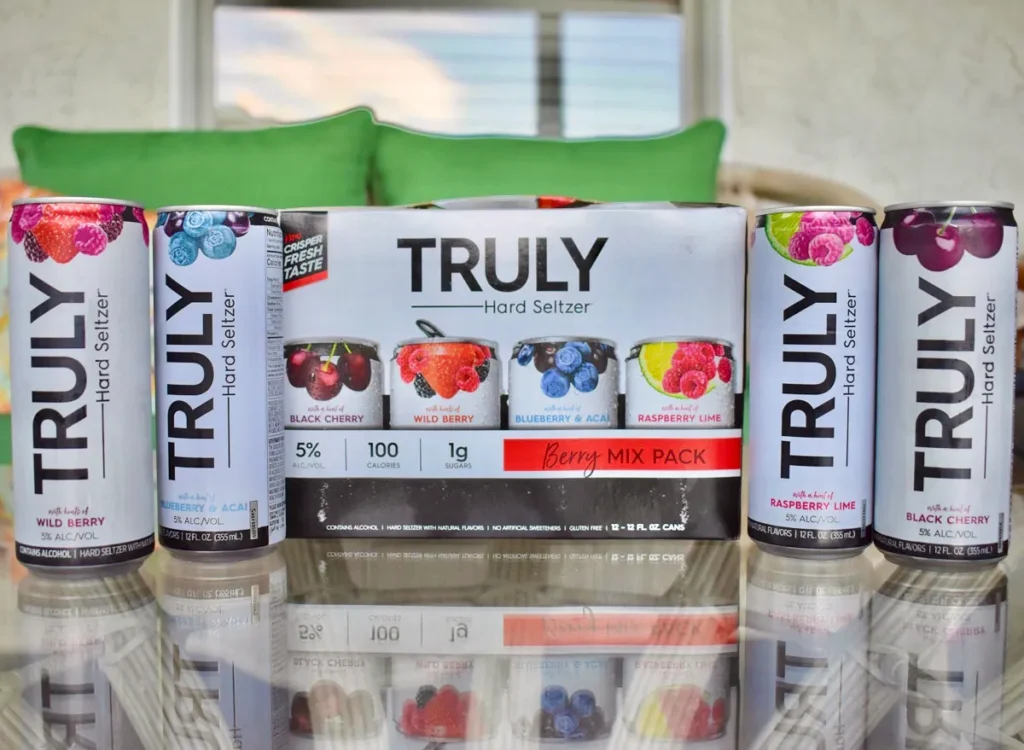
Skunking, a phenomenon often associated with the interaction between hops and ultraviolet (UV) light, is a concern primarily for traditional beers.
However, when it comes to popular hard seltzers like White Claw, Truly, and High Noon, the risk of skunking is notably low. Unlike beers, these hard seltzers typically contain minimal to no hops, a key player in the skunking process.
The ingredients and formulations of these hard seltzer brands contribute to their resilience against skunking.
They often opt for alternative flavor compounds, reducing reliance on hops, which significantly minimizes the likelihood of encountering the unpleasant skunky taste associated with UV light exposure.
Moreover, these hard seltzers are commonly packaged in cans, offering excellent protection against UV light.
Unlike clear or green glass bottles that allow light to penetrate, cans act as a barrier, shielding the beverage from the harmful effects of light and further reducing the risk of skunking.
Now, turning our attention to expiration, it’s essential to note that hard seltzers do have a shelf life. Although not as perishable as some food items, these beverages can experience changes in flavor and carbonation over time.
To determine if a White Claw, Truly, or High Noon hard seltzer is expired, check the packaging for the expiration date. Most manufacturers clearly indicate the recommended timeframe for optimal taste and quality.
If the hard seltzer has surpassed its expiration date, it may not pose health risks, but you might notice alterations in flavor, carbonation levels, or overall freshness.
While hard seltzers are designed for refreshment, consuming them within the suggested timeframe ensures a more consistent and enjoyable drinking experience.
Read more: How Many Shots in a Four Loko
Conclusion: Can hard seltzer get skunked
In conclusion, the risk of hard seltzers like White Claw, Truly, and High Noon getting skunked is notably low due to their ingredients, formulation, and thoughtful packaging choices.
Simple answer to Can hard seltzer get skunked is No. Unlike traditional beers, these popular seltzer brands minimize the use of hops and are commonly housed in protective cans, reducing exposure to ultraviolet light.
Additionally, while hard seltzers have a shelf life, the expiration date serves as a helpful guide to ensure optimal taste and quality.
By storing them properly and being mindful of expiration dates, enthusiasts can enjoy these bubbly beverages with the assurance of a crisp and refreshing experience, free from the concerns of skunking. Cheers to sipping worry-free!
FAQS
Can hard seltzer get skunked in the fridge?
No, hard seltzer is unlikely to get skunked in the fridge. Skunking typically occurs when beverages, particularly those containing hops like beer, are exposed to ultraviolet (UV) light.
The controlled environment of a refrigerator, characterized by darkness and low light exposure, minimizes the risk of skunking.
Therefore, storing hard seltzer in the fridge helps maintain its quality and prevents the development of the off-flavors associated with skunking.
Is expired hard seltzer safe to drink?
Expired hard seltzer is generally safe to drink, as it doesn’t pose immediate health risks. However, its quality may be compromised, leading to changes in flavor, carbonation, or overall freshness.
While consuming expired hard seltzer might not be harmful, it may not provide the best drinking experience.
Do Seltzers Go Bad If They Go From Cold to Hot?
Seltzers generally withstand temperature changes well. Going from cold to hot and back won’t necessarily make them go bad. However, rapid fluctuations may affect carbonation levels, impacting the fizziness. It’s advisable to let seltzers return to a stable temperature before opening to maintain optimal carbonation.
Do White Claws Go Bad If They Go From Cold to Warm?
White Claws and similar hard seltzers are resilient to temperature changes. Going from cold to warm occasionally won’t necessarily make them go bad.
However, for optimal taste and carbonation, it’s recommended to store and consume them within the suggested temperature range.
Can Seltzer Be Stored at Room Temp?
Seltzers can be stored at room temperature without significant issues. While refrigeration maintains optimal freshness, storing at room temperature for a short period is generally fine.
Avoid prolonged exposure to heat or direct sunlight, and be mindful of the expiration date for the best drinking experience.
Does Hard Seltzer Go Bad in Heat?
Hard seltzer is sensitive to prolonged exposure to heat, as high temperatures can alter its quality. While a brief encounter with heat may not immediately spoil it, extended periods in hot conditions can lead to changes in flavor, carbonation, and overall enjoyment. It’s best to store hard seltzer in a cool, dark place to maintain its intended freshness.
Can Seltzers Go Bad?
Seltzers, especially those without added perishable ingredients, typically have a long shelf life. However, they can go bad if exposed to unfavorable conditions like heat, light, or if the packaging is compromised. Checking for changes in flavor, carbonation, or any off-putting odors can help determine if a seltzer has gone bad.
Can White Claw Get Warm and Cold Again?
White Claw and similar hard seltzers can withstand temperature changes, such as going from warm to cold and vice versa.
While occasional fluctuations won’t necessarily spoil the beverage, for optimal taste and carbonation, it’s advisable to store and consume White Claw within the recommended temperature range.
Can You Drink Seltzer That Was Left Out Overnight?
Seltzer left out overnight is generally safe to drink if stored in a clean, sealed container. However, factors like temperature, exposure to contaminants, and the presence of perishable additives can influence its safety and taste.
If it smells or tastes off, it’s better to err on the side of caution and discard it to ensure a pleasant drinking experience.
Why Does My Hard Seltzer Smell Like Sulfur?
A sulfur-like smell in hard seltzer can result from various factors. It may indicate a reaction between certain compounds in the beverage and exposure to light or air. This aroma is often associated with spoilage. Check for packaging integrity, storage conditions, and ensure the seltzer hasn’t expired to maintain its intended quality.
Can Hard Seltzer Get Oxidized?
Yes, hard seltzer can get oxidized, especially if exposed to air for prolonged periods. Oxygen can react with certain components in the seltzer, leading to off-flavors and a decline in quality. Proper sealing of the container and refrigeration can help mitigate the risk of oxidation.
What Is the Shelf Life of White Claw Hard Seltzer?
The shelf life of White Claw hard seltzer is typically indicated on the packaging. While it varies, most hard seltzers have a considerable shelf life. Storing them in a cool, dark place and consuming them within the recommended timeframe ensures the best taste and quality.
Do Seltzers Go Bad If Not Refrigerated?
Seltzers can remain safe for consumption if not refrigerated, but their quality may be compromised over time. Exposure to heat and light accelerates the aging process, potentially leading to changes in flavor and carbonation. Refrigerating seltzers helps preserve their intended freshness.
Do Seltzers Need to Be Cold?
While seltzers don’t necessarily need to be cold, refrigeration maintains their optimal taste and carbonation. Cold temperatures slow down chemical reactions that can affect quality. If seltzers are stored at room temperature, it’s crucial to shield them from heat and light for extended freshness.
Does White Claw Expire If Not Refrigerated?
White Claw and similar hard seltzers may expire if not refrigerated, especially if stored in unfavorable conditions.
While they don’t need constant refrigeration, keeping them in a cool, dark place helps maintain the intended taste and quality. Checking the expiration date ensures the seltzer is consumed within its recommended timeframe.
How Do You Store Opened Seltzer?
Once opened, store seltzer in the refrigerator to preserve its carbonation and flavor. Sealing the container tightly prevents exposure to air, minimizing the risk of oxidation.
If refrigeration isn’t possible, keep the opened seltzer in a cool, dark place, and consume it within a reasonable timeframe for the best drinking experience.
How long can hard seltzers be left out of the refrigerator?
Hard seltzers can be left out of the refrigerator for a short period without immediate spoilage concerns. However, the optimal freshness and quality are preserved when they are refrigerated.
If left at room temperature, it’s advisable to consume them within a reasonable timeframe, generally within a few hours.
Prolonged exposure to heat can lead to changes in flavor, carbonation, and overall enjoyment. To ensure the best drinking experience, refrigerate hard seltzers whenever possible and avoid leaving them at room temperature for an extended duration.
You may wanna check out

